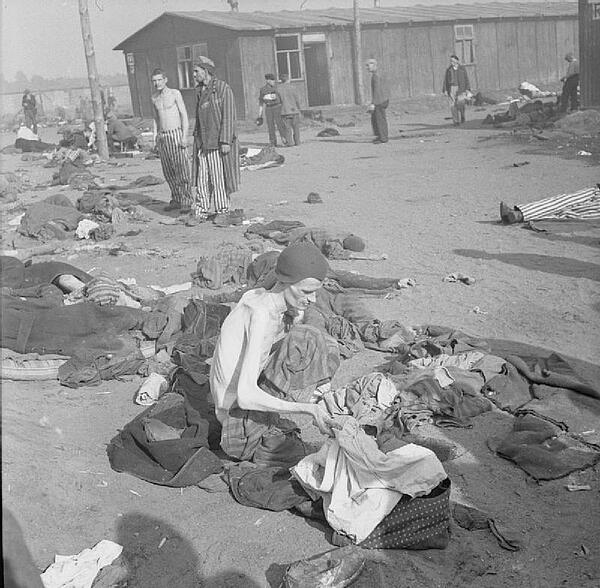Belsen in 1945
When British and Canadian troops liberated Belsen in 1945, they found over 13,000 unburied bodies and 60,000 sick and starving people. A typhus epidemic had killed thousands of inmates in 1945, and the condition of the survivors was shocking. Even following the liberation of the Bergen-Belsen camp, up to 500 people died from illness and starvation each day.
When the British and Canadians advanced on Bergen-Belsen in April 1945, the German army negotiated a truce and exclusion zone around the camp to prevent the spread of typhus. On 15 April, 120 British soldiers turned up at the camp and upon their arrival they found 400 German guards, 200 SS troops and 4,000 Hungarian soldiers still in the camp. A deal was agreed to that the soldier at the camp would stay there and continue to work but later be given a safe passage back to return.
Colonel J Johnstone, who was part of the Royal Army Medical Corps that first arrived at camp, said:
"I found a very great number of dazed, apathetic, human scarecrows, wandering around the camp in an aimless fashion, dressed in rags and some even without rags. There were piles of dead everywhere - right up to the front gate."

By the time the allies arrived at Belsen the German guards had destroyed all official records about the camp, as they had been told to by senior Nazi personnel in Berlin. The SS troops were forced to bury the bodies littered around the camp using their bare hands.
Brigadier Hughes later described the lack the guards’ complete lack of compassion. He explained that the camp doctor existed in a state of “dumb insolence”.
One of the problems faced by the Allies was how best to feed the starved prisoners. It is estimated that around 1,000 died as a result of British soldiers giving them their rations, which were too rich for their weakened stomachs. Hughes said in the conclusion to his investigation that Belsen differed from other death camps like Auschwitz because there were no signs of no systematic atrocities, although he said that evidence did suggest that prisoners might have been cremated before they were actually dead. He also reported that there was evidence that some prisoners had resorted to cannibalism before their liberation.
Another problem faced by Hughes was giving equal rations to each prisoner. On the night of 15 April, he said there had been a riot among prisoners because they were fighting over their potato rations, leading the German troops to open fire and kill several. Hughes responded by informing the soldiers that for every one inmate shot, a German or Hungarian soldier would be killed.
Just under 100 medical students travelled to the camp from London on 2 May 1945.
In a book entitled "The Belsen Trial" by Raymond Phillips, published in 1949, Brigadier Glyn-Hughes is quoted in this description of the terrible scene that the British found at Bergen-Belsen:
"The conditions in the camp were really indescribable; no description nor photograph could really bring home the horrors that were there outside the huts, and the frightful scenes inside were much worse. There were various sizes of piles of corpses lying all over the camp, some in between the huts. The compounds themselves had bodies lying about in them. The gutters were full and within the huts there were uncountable numbers of bodies, some even in the same bunks as the living. Near the crematorium were signs of filled-in mass graves, and outside to the left of the bottom compound was an open pit half-full of corpses.”
The hygiene of the camp was the primary concern when the Brits first arrived; they had to address issues like there being no running water or working showers or toilets. The administrators of the camp told the British soldiers that the problems had come about because of Allied bombing.
The British also had to take into account the mental trauma of most of the inmates. Some were so traumatised that they refused to leave their hut for better accommodation.
Between 15 and 30 April, all of the German troops disappeared. While it is not officially known what happened, some inmates that survived have suggested they were killed out of revenge by the prisoners.
See also: Bergen-Belsen Concentration Camp
MLA Citation/Reference
"Belsen in 1945". HistoryLearning.com. 2026. Web.
